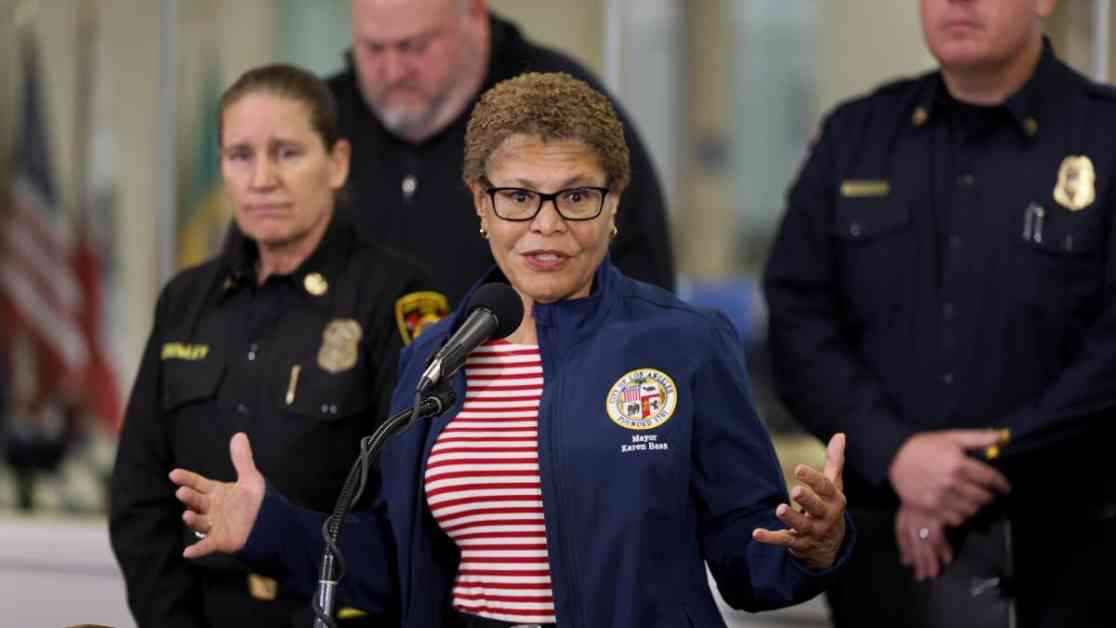Foes of Los Angeles Mayor Karen Bass have recently taken a significant step towards a potential recall campaign against her. A fundraising committee has been formed by her opponents, as per paperwork filed with the city’s Ethics Commission on Monday. This move comes after the initial paperwork submission to the state last week, indicating a growing momentum behind the recall efforts.
The filing of the committee, coming almost two months after a devastating wildfire ravaged parts of L.A.’s Pacific Palisades neighborhood, signifies a new phase in the opposition to Mayor Bass. This committee will enable her adversaries to raise funds to advance their cause and eventually bring a recall vote to the city’s ballot. However, the City Clerk’s office has not yet confirmed whether a recall petition has been filed or if the signature gathering process has commenced.
Amidst these developments, it has become apparent that some of the key figures behind the Bass recall campaign have ties to the Republican Party. This association might pose a challenge to the campaign’s reception in a predominantly Democratic city like Los Angeles. Douglas Herman, a political strategist representing Mayor Bass, dismissed the recall committee’s filing as a “right-wing political stunt” aimed at creating divisions in the city during a crucial period.
Challenges and Tensions
Mayor Bass, a former Democratic congresswoman with a 12-year tenure, has faced mounting criticism for her handling of the aftermath of the Palisades fire. Her absence during the crisis and subsequent communication challenges upon her return have fueled discontent among residents and officials. The removal of Fire Chief Kristin Crowley further exacerbated tensions, leading to an impending City Council vote on Crowley’s dismissal appeal.
In addition to internal conflicts, Bass has encountered strained relationships with key figures like Los Angeles County Supervisor Lindsey Horvath. The recent fallout with her appointed recovery czar, Steve Soboroff, over compensation discrepancies has added another layer of complexity to her administration’s challenges. These interpersonal frictions have contributed to a sense of discord within the local governance structure, hinting at potential vulnerabilities that recall proponents are keen to exploit.
Recall Strategy and Path Forward
The recall committee, spearheaded by Sahil Nandwani, a real estate agent with Republican affiliations, has set the stage for a rigorous fundraising and outreach campaign. Nandwani’s previous involvement with political donations and party activities suggests a strategic approach to garnering support for the recall effort. However, questions about the committee’s intentions and strategies remain unanswered, as political strategist Gerald Sirotnak, the committee’s designated contact, has not provided further details.
To initiate a recall election, the opposition to Mayor Bass would need to amass approximately 330,000 signatures within a 120-day window, representing 15% of the city’s registered voters. This threshold has historically proven to be a formidable challenge, as seen in past recall attempts that ultimately faltered due to signature collection shortfalls. The case of Councilmember Mike Bonin, where a recall drive fell just shy of the required signatures, serves as a cautionary tale for the Bass recall campaign.
Looking ahead, the recall committee faces a daunting task of mobilizing supporters, navigating legal and logistical hurdles, and sustaining momentum over the coming months. The shadow of past unsuccessful recall efforts looms large, underscoring the uphill battle that lies ahead for those seeking to unseat Mayor Bass through democratic means.
In conclusion, the unfolding saga of the recall campaign against Mayor Karen Bass paints a vivid picture of political upheaval, personal conflicts, and grassroots activism in the heart of Los Angeles. As the city braces for a potential showdown at the ballot box, the fate of its leadership hangs in the balance, with implications that extend far beyond the boundaries of City Hall. Only time will tell whether the voices of dissent will be able to reshape the course of local governance and usher in a new era of political change.


